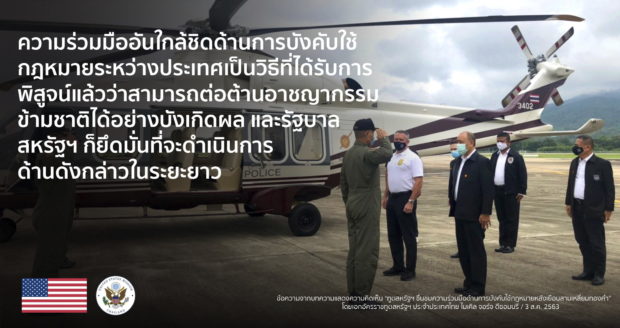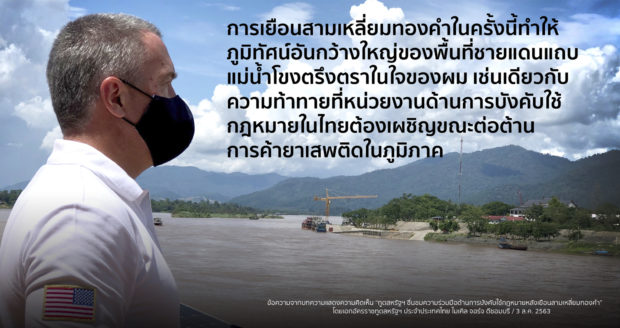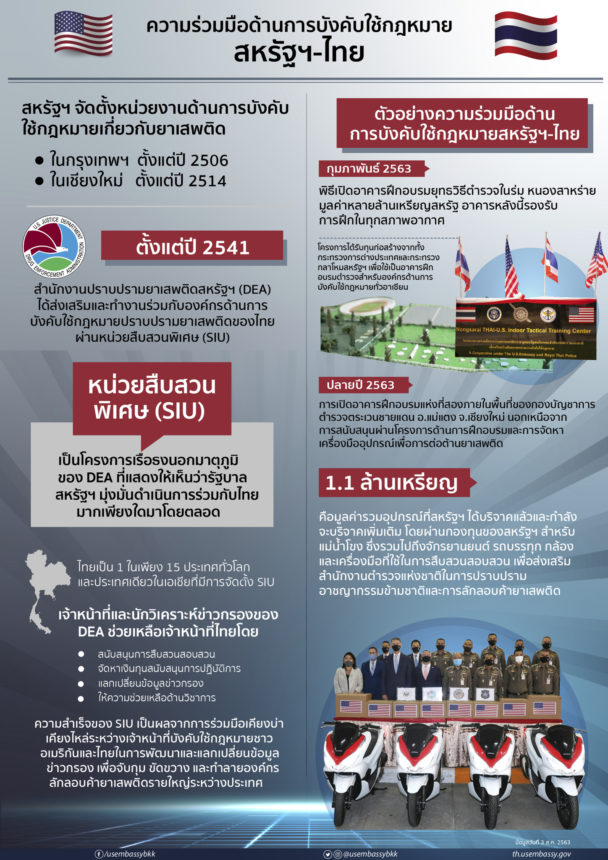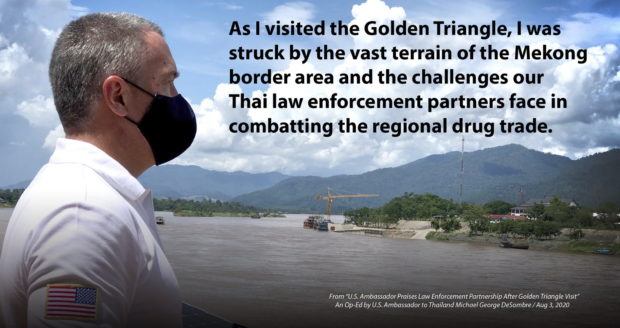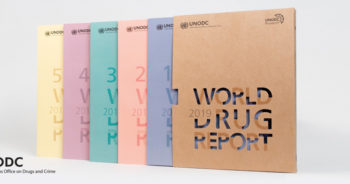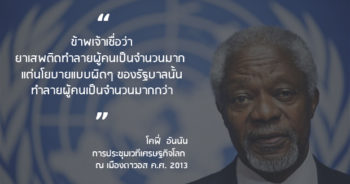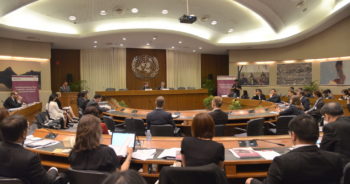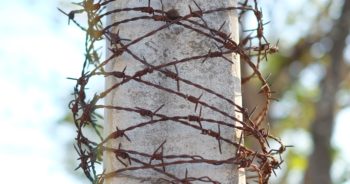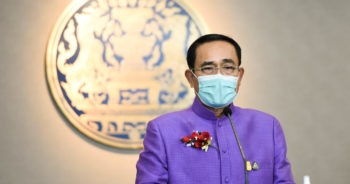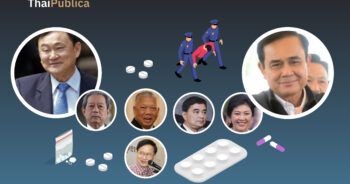ไมเคิล จอร์จ ดีซอมบรี เอกอัครราชทูตสหรัฐอเมริกาประจำประเทศไทย
จากกลางอากาศ ผมเห็นแม่น้ำโขงอันยิ่งใหญ่ไหลคดเคี้ยวผ่านป่าทึบ สีน้ำตาลอ่อนของสายน้ำตัดกับแมกไม้เขียวขจีที่ปกคลุมแนวเขาซึ่งทอดยาวเกือบถึงริมน้ำ แม้จะบินอยู่บนเฮลิคอปเตอร์ห่างจากพื้นดินขึ้นไปหลายร้อยฟุต แต่ผมก็ยังอดรู้สึกตื่นตาตื่นใจกับแม่น้ำโขงไม่ได้ โชคดีที่ได้มาเห็นภาพแบบนี้ในช่วงฝนชุกที่สุด แม้ระดับน้ำจะยังต่ำกว่าค่าเฉลี่ยในช่วงนี้ของปี แต่ก็ได้ฟื้นตัวจากสถานการณ์ในเดือนก่อนๆ ที่แม่น้ำสายนี้เปลี่ยนไปจากเดิมมากจนแทบจะจำไม่ได้ เพราะภัยแล้งที่เกิดจากการควบคุมบรรดาเขื่อนต้นน้ำ
สัปดาห์ที่ผ่านมา ผมได้รับเกียรติให้เดินทางไปยังสามเหลี่ยมทองคำร่วมกับพลตำรวจโท ชินภัทร สารสิน ผู้บัญชาการตำรวจปราบปรามยาเสพติด สำนักงานตำรวจแห่งชาติ ตลอดจนหุ้นส่วนใกล้ชิดของเราจากหน่วยงานรัฐบาลไทย เพื่อเยี่ยมชมฐานปฏิบัติการดอยช้างมูบและจุดชมวิวต่างๆ ซึ่งทำให้ผมเห็นเมียนมาและลาวจากอีกฟากของแม่น้ำได้
น่าเสียดายที่ความสวยงามของภูมิภาคนี้มักถูกบดบังด้วยข่าวและรายงานเกี่ยวกับการค้ามนุษย์ สัตว์ป่า และโดยเฉพาะอย่างยิ่ง ยาเสพติด แต่สิ่งที่คนได้ยินน้อยกว่าข่าวสารเหล่านั้นคือความร่วมมือที่ดีเยี่ยมระหว่างหน่วยงานด้านการบังคับใช้กฎหมายของสหรัฐฯ และไทย รวมทั้งความคืบหน้าในการคุ้มครองพลเมืองของเราทั้งสองประเทศ แม้จะมีความท้าทายดังกล่าว แต่สหรัฐฯ และไทยก็ได้ร่วมกันต่อต้านองค์กรอาชญากรรมผ่านการสืบสวนสอบสวนและปฏิบัติการด้านการบังคับใช้กฎหมาย
ช่วงไม่กี่ปีมานี้ ไทยได้ตรวจยึดเมทแอมเฟตามีนมากกว่าประเทศใดในเอเชียตะวันออกและเอเชียตะวันออกเฉียงใต้ โดยปริมาณที่ยึดได้ในปี 2561 และ 2562 คือ 116 ตัน นอกจากนี้ สำนักงานป้องกันยาเสพติดและปราบปรามอาชญากรรมแห่งสหประชาชาติ (UNODC) ยังรายงานว่า ปริมาณเมทแอมเฟตามีนชนิดเม็ด (ยาบ้า) ที่ไทยยึดได้ยังสูงขึ้นเป็น 3 เท่าในช่วงเวลา 5 ปี นั่นคือ จาก 113 ล้านเม็ดในปี 2557 เป็น 381 ล้านเม็ดในปี 2562 ในช่วงเวลาเดียวกันนั้น การยึดยาไอซ์ของไทยก็เพิ่มขึ้นอย่างมาก จาก 1,017 กิโลกรัมในปี 2557 เป็น 17,077 กิโลกรัมในปี 2562 ผมภูมิใจที่สหรัฐฯ ได้ช่วยให้พันธมิตรชาวไทยของเราบรรลุหลักชัยเหล่านี้ แต่หนทางข้างหน้ายังอีกยาวไกลนัก
รายงาน Synthetic Drugs in East and Southeast Asia (ยาเสพติดสังเคราะห์ในเอเชียตะวันออกและเอเชียตะวันออกเฉียงใต้) เดือนพฤษภาคม 2563 ของ UNODC ระบุว่า เมทแอมเฟตามีนยังคงเป็นยาเสพติดหลักที่น่ากังวลในประเทศไทย
หน่วยงานด้านการบังคับใช้กฎหมายได้ตรวจยึดยาบ้าและยาไอซ์มากเป็นประวัติการณ์ตามแนวแม่น้ำโขงในช่วงปีหลังๆ มานี้ และมีตัวเลขประมาณการว่า ตลาดยาเสพติดประเภทดังกล่าวในภูมิภาคนี้มีมูลค่า 61,000 ล้านเหรียญสหรัฐต่อปี ซึ่งเกือบเทียบเท่ากับผลิตภัณฑ์มวลรวมในประเทศ (GDP) ของเมียนมา
อย่างไรก็ตาม การตรวจยึดที่เพิ่มขึ้นไม่ได้เป็นเพียงสัญญาณว่าปฏิบัติการของเจ้าหน้าที่ตำรวจมีประสิทธิผลมากขึ้นเท่านั้น แต่ยังหมายความว่ามีการผลิตยาเสพติดปริมาณสูงขึ้นด้วย โดยจะเห็นได้จากมูลค่าของยาเสพติด เมทแอมเฟตามีนในไทยมีราคาตลาดลดลงถึง 2 ใน 3 จากปี 2553 ถึง 2563 แม้ว่าจะมีการตรวจยึดที่เพิ่มขึ้นอย่างมาก ในขณะที่ความบริสุทธิ์ของยายังคงสูงเท่าเดิม และสูงขึ้นด้วยซ้ำในบางกรณี ยาเสพติดสังเคราะห์ (ที่มนุษย์ผลิตขึ้น) เช่น เมทแอมเฟตามีน มีราคาถูกกว่าและใช้กำลังคนผลิตน้อยกว่าการดูแลและเก็บเกี่ยวพืชมาผลิตยา จึงเป็นการเพิ่มทั้งศักยภาพการผลิตและผลกำไรให้สูงขึ้น อีกทั้งยังดึงดูดความสนใจขององค์กรลักลอบค้ายาเสพติดมากขึ้นด้วย
ไม่ใช่เพียงแค่ยาเสพติดเท่านั้นที่เป็นปัญหา แต่สารเคมีตั้งต้นที่นำมาผลิตยาก็เป็นปัญหาด้วยเช่นกัน พูดง่ายๆ ก็คือ ถ้าไม่มีสารเคมีตั้งต้นก็ไม่มียาบ้า ทางการไทยยึดโซเดียมไซยาไนด์ ซึ่งเป็นสารเคมีตั้งต้นสำคัญในการผลิตเมทแอมเฟตามีน 5,550 กิโลกรัมในปี 2557 และจนถึงปี 2562 จำนวนดังกล่าวได้เพิ่มเป็น 99,750 กิโลกรัม
สถานการณ์นี้เป็นเพียงเศษเสี้ยวของปัญหาที่ใหญ่กว่านั้นมาก เรารู้ว่าสารเคมีตั้งต้นอื่นๆ มากมายได้หลุดรอดการตรวจค้นไป โดยผ่านเข้ามาจากนอกเอเชียตะวันออกเฉียงใต้ อาชญากรข้ามชาติแสวงประโยชน์จากพื้นที่แนวชายแดนของเมียนมาและลาวที่ติดกับสาธารณรัฐประชาชนจีน เพื่อลักลอบขนส่งสารเคมีเพื่อการผลิตยาเสพติด โดยสารเคมีเหล่านั้นส่วนใหญ่แล้วมีต้นกำเนิดมาจากประเทศจีน
เมื่อมองข้ามฝั่งแม่น้ำโขงไปยังคิงส์ โรมันส์ กาสิโน ในเขตเศรษฐกิจพิเศษสามเหลี่ยมทองคำของลาว ผมเห็นอิทธิพลของข้อริเริ่มหนึ่งแถบหนึ่งเส้นทางของจีนได้อย่างเด่นชัดจากการก่อสร้างใหม่ที่เกิดขึ้น แม้จะมีผลกระทบจากโรคโควิด-19 กระทรวงการคลังสหรัฐฯ มีคำสั่งคว่ำบาตรคิงส์ โรมันส์ กาสิโน เนื่องจากกาสิโนดังกล่าวดำเนินการฟอกเงินและและลักลอบค้ายาเสพติด ตลอดจนก่ออาชญากรรมร้ายแรงอื่นๆ
ทั้งนี้บ่อนการพนันมักมีส่วนพัวพันกับสถาบันการธนาคารระดับชาติ ซึ่งอาจส่งผลให้ผู้ไม่ประสงค์ดีใช้เป็นเครื่องมือแทรกซึมระบบการธนาคารของชาติ ทั้งในฮ่องกงและประเทศอื่นๆ ได้ กิจการผิดกฎหมาย เช่น การฟอกเงินและการลักลอบค้ายาเสพติด สั่นคลอนความมั่นคงชายแดน เพิ่มภาระให้ระบบบริการสาธารณสุข บั่นทอนธุรกิจที่ถูกกฎหมาย อีกทั้งยังเพิ่มโอกาสในการทุจริตเนื่องจากหลักนิติธรรมเสื่อมโทรมอีกด้วย และแน่นอนว่าสถานการณ์อันเลวร้ายนี้ยังส่งผลต่อเพื่อนมนุษย์ด้วยเช่นกัน เฉพาะในปี 2562 คนไทยกว่า 210,000 คนต้องเข้ารับการรักษาในโรงพยาบาลเนื่องจากติดยาเสพติด
ความร่วมมืออันใกล้ชิดด้านการบังคับใช้กฎหมายระหว่างประเทศเป็นวิธีที่ได้รับการพิสูจน์แล้วว่าสามารถต่อต้านอาชญากรรมข้ามชาติได้อย่างบังเกิดผล และรัฐบาลสหรัฐฯ ก็ยึดมั่นที่จะดำเนินการด้านดังกล่าวในระยะยาว ประเทศเรามีคำกล่าวว่า “อย่าทำแต่ปาก” ซึ่งหมายถึงการพูดอย่างเดียวไม่สามารถแก้ปัญหาได้ แต่จะต้องลงมือทำด้วย สหรัฐฯ เองได้ลงแรงดำเนินการต่างๆ เสมอมา ดังเช่นการที่เราจัดตั้งหน่วยงานด้านการบังคับใช้กฎหมายเกี่ยวกับยาเสพติดในกรุงเทพมหานครมาตั้งแต่ปี 2506 และในเชียงใหม่ตั้งแต่ปี 2514
นอกจากนี้ สำนักงานปราบปรามยาเสพติดสหรัฐฯ (DEA) ยังได้ส่งเสริมและทำงานร่วมกับองค์กรด้านการบังคับใช้กฎหมายปราบปรามยาเสพติดของไทยตั้งแต่ปี 2541 ผ่านหน่วยสืบสวนพิเศษ (SIU) ซึ่งเป็นโครงการเรือธงนอกมาตุภูมิของ DEA ที่แสดงให้เห็นว่ารัฐบาลสหรัฐฯ มุ่งมั่นดำเนินการร่วมกับไทยมากเพียงใดมาโดยตลอด
ไทยเป็น 1 ในเพียง 15 ประเทศทั่วโลก และประเทศเดียวในเอเชียที่มีการจัดตั้ง SIU เจ้าหน้าที่และนักวิเคราะห์ข่าวกรองของ DEA ปฏิบัติหน้าที่ประจำหน่วยดังกล่าวเพื่อเป็นที่ปรึกษาด้านการสืบสวนสอบสวน จัดหาเงินทุนสนับสนุนการปฏิบัติการ แลกเปลี่ยนข้อมูลข่าวกรอง และให้ความช่วยเหลือด้านวิชาการกับเจ้าหน้าที่ไทย ความสำเร็จของ SIU เป็นผลจากการร่วมมือเคียงบ่าเคียงไหล่ระหว่างเจ้าหน้าที่บังคับใช้กฎหมายชาวอเมริกันและไทยในการพัฒนาและแลกเปลี่ยนข้อมูลข่าวกรอง เพื่อจับกุม ขัดขวาง และทำลายองค์กรลักลอบค้ายาเสพติดรายใหญ่ระหว่างประเทศ
ตัวอย่างความมุ่งมั่นในด้านดังกล่าวของสหรัฐฯ คือ พิธีเปิดอาคารฝึกอบรมยุทธวิธีตำรวจในร่ม หนองสาหร่าย เมื่อเดือนกุมภาพันธ์ที่ผ่านมา อาคารมูลค่าหลายล้านเหรียญสหรัฐหลังนี้รองรับการฝึกในทุกสภาพอากาศ โดยได้รับทุนก่อสร้างจากทั้งกระทรวงการต่างประเทศและกระทรวงกลาโหมสหรัฐฯ เพื่อใช้เป็นอาคารฝึกอบรมตำรวจสำหรับองค์กรด้านการบังคับใช้กฎหมายทั่วอาเซียนในช่วงปลายปีนี้ รัฐบาลสหรัฐฯ จะช่วยเหลือไทยในการเปิดอาคารฝึกอบรมแห่งที่สองภายในพื้นที่ของกองบัญชาการตำรวจตระเวนชายแดน อำเภอแม่แตง จังหวัดเชียงใหม่
นอกเหนือจากการสนับสนุนผ่านโครงการด้านการฝึกอบรมและการจัดหาเครื่องมืออุปกรณ์เพื่อการต่อต้านยาเสพติด ในขณะเดียวกัน รัฐบาลสหรัฐฯ ได้บริจาคอุปกรณ์มูลค่ากว่า 600,000 เหรียญสหรัฐ ซึ่งรวมไปถึงจักรยานยนต์ รถบรรทุก กล้อง และเครื่องมือที่ใช้ในการสืบสวนสอบสวน ให้แก่หน่วยงานด้านการบังคับใช้กฎหมายของไทย โดยผ่านกองทุนของสหรัฐฯ สำหรับแม่น้ำโขง และในเวลาไม่นานหลังจากนี้ เราจะบริจาคอุปกรณ์การเฝ้าระวัง ชุดสำหรับการดำเนินยุทธวิธี รถบรรทุก เรือ และรถพ่วงเพิ่มเติม เพื่อส่งเสริมสำนักงานตำรวจแห่งชาติในการปราบปรามอาชญากรรมข้ามชาติและการลักลอบค้ายาเสพติด ทำให้มูลค่าการบริจาครวมอยู่ที่ 1.1 ล้านเหรียญสหรัฐ แม้ตัวเลขเหล่านี้จะน่าประทับใจ แต่ก็ไม่สำคัญเท่าผลลัพธ์ที่มีต่อชีวิตของประชาชน เงินทุกสตางค์ที่ใช้ ยาบ้าทุกเม็ดที่ยึดได้ ล้วนช่วยให้ชุมชนปลอดภัยขึ้น
สหรัฐอเมริกาและไทยมีความผูกพันกันไม่เพียงแต่ในฐานะพันธมิตรตามสนธิสัญญาเท่านั้น แต่เรายังเป็นเพื่อนของกันและกันอีกด้วย การเยือนสามเหลี่ยมทองคำในครั้งนี้ทำให้ภูมิทัศน์อันกว้างใหญ่ของพื้นที่ชายแดนแถบแม่น้ำโขงตรึงตราในใจของผม เช่นเดียวกับความท้าทายที่หน่วยงานด้านการบังคับใช้กฎหมายในไทยต้องเผชิญขณะต่อต้านการค้ายาเสพติดในภูมิภาค ผมขอกล่าวกับเพื่อนชาวไทยในฐานะพันธมิตรของท่านว่า รัฐบาลสหรัฐฯ มุ่งมั่นที่จะส่งเสริมไทยในการต่อสู้นี้อย่างแน่วแน่ไม่เปลี่ยนแปลง
………
U.S. Ambassador Praises Law Enforcement Partnership After Golden Triangle Visit
From the air, I could see the mighty Mekong snaking through the jungle, its light-brown waters contrasting with the green canopy of the mountains that come almost to the river’s edge. Even from a helicopter hundreds of feet above the ground, it was impossible not to be awed by the river, and I feel lucky to have seen it during the height of the rainy season. While the river’s flow is still below average for this time of year, it has recovered from previous months when it was a shadow of its former self, drought thrust upon it by the control of up-river dams. This week, I was privileged to travel to the Golden Triangle with Royal Thai Police Narcotics Suppression Bureau (NSB) Commissioner Lieutenant General Chinnapat Sarasin and our close partners from the Royal Thai Government, visiting the Doi Chang Moob army outpost and other viewing areas, where I was able to look across the river into Myanmar and Laos.
Unfortunately, the beauty of this region is often overshadowed by news and reports of the trafficking of humans, wildlife, and especially drugs. What is less well-known is the tremendous cooperation between U.S. and Thai law enforcement, and the progress we are making to protect the citizens of our two countries. Despite the challenges, together we have countered criminal organizations through joint investigations and enforcement operations. In recent years, Thailand has seized more methamphetamine than any other country in East and Southeast Asia, confiscating 116 tons in 2018 and 2019. Seizures of methamphetamine tablets (yaba) tripled over a five-year period from 113 million in 2014 to 381 million in 2019, according to the UN Office on Drugs and Crime (UNODC). During that same time-period, seizures of crystal meth increased dramatically from 1,017 kg in 2014 to 17,077 in 2019. I am proud of the assistance the United States has provided our Thai allies to help them achieve these milestones. Yet the job is far from done.
In its May 2020 Synthetic Drugs in East and Southeast Asia report, UNODC noted that methamphetamine remains the primary drug of concern in Thailand. Law enforcement made record tablet and crystal meth seizures across the Mekong in recent years and estimates value the regional market at $61 billion per year, which is nearly as much as the entire GDP of Myanmar. However, increased seizures are a sign not only of more effective policing but also of rising production. We see evidence of this in the value of drugs. The street price of methamphetamine in Thailand actually decreased by two-thirds from 2010 to 2020, despite the dramatic increase in seizures, while the purity of the pills remains as high as ever and, in some cases, has even increased. Synthetic (man-made) drugs such as methamphetamine are cheaper and less labor-intensive than tending and harvesting fields for plant-based drugs, thus increasing the production capacity, profitability, and appeal for drug trafficking organizations.
And it is not only the drugs themselves that present a problem but also the precursor chemicals that make the drugs possible. To put it simply, there would be no methamphetamine tablets without the precursor chemicals used to make them. Thai authorities seized 5,550 kg of sodium cyanide in 2014, a vital precursor for the production of methamphetamine; by 2019, that volume had increased to 99,750 kg. This is only the tip of the iceberg. We know many other precursor chemicals are slipping through, coming from beyond Southeast Asia. Transnational criminals are exploiting the border areas that Myanmar and Laos share with the People’s Republic of China (PRC) to traffic chemicals for drug production – chemicals primarily originating in the PRC.
Looking across the Mekong River toward the Kings Romans Casino in Laos’ Golden Triangle Special Economic Zone, the influence of the PRC’s One Belt One Road Initiative was evident as I witnessed new construction occurring despite the impact of COVID-19. The U.S. Treasury Department sanctioned Kings Romans Casino because the casino laundered money and trafficked drugs, among other serious crimes. Casinos are often linked to national banking institutions, which can then be used by nefarious actors to infiltrate regional banking systems in Hong Kong and elsewhere. Illegal enterprises, such as money laundering and drug trafficking, destabilize border security, strain public health services, undermine legitimate business, and increase the opportunities for corruption as the rule of law breaks down. And there is, of course, a very human side to this tragedy. In 2019 alone, more than 210,000 Thais were admitted to hospitals for drug treatment.
Close international law enforcement partnerships are the proven method to successfully combat transnational crime, and the U.S. government is in it for the long-haul. There is a phrase in the United States – you must put your money where your mouth is – which means you can’t just talk about a problem, you also have to act. And the United States has been acting! The United States has had a federal drug law enforcement presence in Bangkok since 1963 and in Chiang Mai since 1971. Since 1998, the DEA has been supporting and working alongside our Thai law enforcement counterparts through the Sensitive Investigative Unit (SIU) – the DEA’s flagship overseas program that demonstrates the level of commitment the U.S. government maintains for Thailand. Thailand is one of just 15 countries worldwide and the only country in Asia with an established SIU. DEA agents and intelligence analysts are embedded in the unit and act as agent advisors to provide investigative support, operational funding, intelligence sharing, and technical assistance to our Thai partners. The SIUs are successful because U.S. and Thai law enforcement officers work side-by-side to develop and share intelligence in order to make arrests and disrupt and dismantle major international drug-trafficking organizations.
A recent example of our commitment to this effort was February’s opening ceremony for a multi-million dollar all-weather training facility at the Royal Thai Police Central Police Tactical Training Center in Nong Sarai. The project was jointly funded by the U.S. Department of State and the U.S. Department of Defense and serves as a police training center for law enforcement agencies throughout ASEAN. The U.S. government will help Thailand open a second training facility in Mae Taeng, Chiang Mai, on a Royal Thai Border Patrol Police base this autumn, in addition to providing a counter-narcotics training and equipment program. Concurrently, the U.S. Government has donated more than $600,000 worth of equipment to Thai law enforcement agencies, including motorcycles, trucks, cameras, and investigative tools through the U.S. Mekong Fund. In the coming weeks and months, we will be donating additional surveillance equipment, tactical clothing, trucks, and boats and trailers, for a combined total donation of $1.1 million, to help the Royal Thai Police fight transnational crime and drug trafficking. These numbers are impressive, but not nearly as important as the impact they have on people’s lives. Every dollar spent, every yaba pill seized, helps keep communities safe.
The United States and Thailand are bound not only as Treaty Allies but also as friends. As I visited the Golden Triangle, I was struck by the vast terrain of the Mekong border area and the challenges our Thai law enforcement partners face in combatting the regional drug trade. As your ally, I say to my Thai friends that the commitment of the U.S. Government to support you in this fight is steadfast and enduring.
U.S. Ambassador Michael George DeSombre
